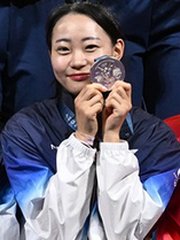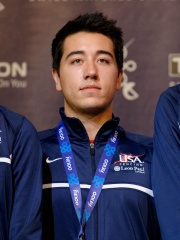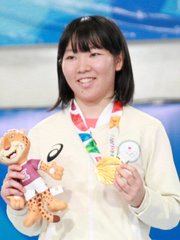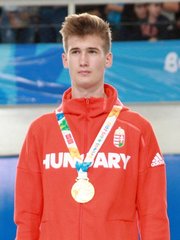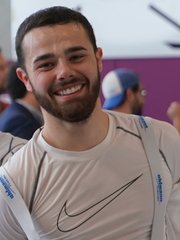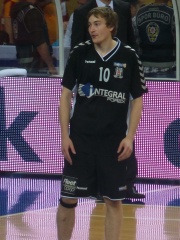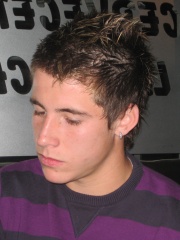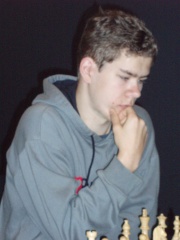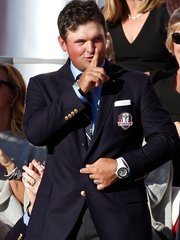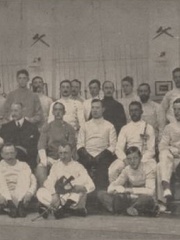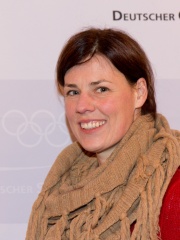Fencer
Ali Pakdaman
1990 - today

 Ali Pakdaman
Ali Pakdaman
Seyed Ali Esmaeilzadeh Pakdaman (Persian: سید علی اسماعیلزاده پاکدامن; born 23 August 1990) is an Iranian fencer. He competed in the men's sabre event at the 2016 and 2020 Summer Olympics. He also competed at the 2024 Summer Olympics in both the individual and team men's sabre event. His team got 4th in the team event after beating number two seed USA 45-44, but then losing its next two matches to Hungary and France. Read more on Wikipedia
His biography is available in 10 different languages on Wikipedia. Ali Pakdaman is the 446th most popular fencer (down from 347th in 2024), the 1,909th most popular biography from Netherlands (down from 1,670th in 2019) and the 4th most popular Dutch Fencer.
Memorability Metrics
Page views of Ali Pakdaman by language
Among Fencers
Among fencers, Ali Pakdaman ranks 446 out of 349. Before him are Choi Se-bin, Gerek Meinhardt, Rossella Gregorio, Maximilien Chastanet, Yuka Ueno, and Guilherme Toldo. After him are Krisztián Rabb, Chen Haiwei, Nick Itkin, Sébastien Patrice, Matyas Szabo, and Emily Cross.
Most Popular Fencers in Wikipedia
Go to all RankingsChoi Se-bin
2000 - Present
HPI: 30.95
Rank: 440
Gerek Meinhardt
1990 - Present
HPI: 30.89
Rank: 441
Rossella Gregorio
1990 - Present
HPI: 30.81
Rank: 442
Maximilien Chastanet
1996 - Present
HPI: 30.66
Rank: 443
Yuka Ueno
2001 - Present
HPI: 30.55
Rank: 444
Guilherme Toldo
1992 - Present
HPI: 30.43
Rank: 445
Ali Pakdaman
1990 - Present
HPI: 30.41
Rank: 446
Krisztián Rabb
2001 - Present
HPI: 30.35
Rank: 447
Chen Haiwei
1994 - Present
HPI: 30.31
Rank: 448
Nick Itkin
1999 - Present
HPI: 30.29
Rank: 449
Sébastien Patrice
2000 - Present
HPI: 30.27
Rank: 450
Matyas Szabo
1991 - Present
HPI: 30.17
Rank: 451
Emily Cross
1986 - Present
HPI: 30.14
Rank: 452
Contemporaries
Among people born in 1990, Ali Pakdaman ranks 1,823. Before him are Ryan Broekhoff, Dani Aquino, Thomas Rhett, Carlota Ciganda, Hana Matelová, and Joy Buolamwini. After him are Karl Darlow, Jon Ludvig Hammer, Patrick Reed, Barbora Hermannová, Robert Griffin III, and Kenji Sekido.
Others Born in 1990
Go to all RankingsRyan Broekhoff
BASKETBALL PLAYER
1990 - Present
HPI: 30.51
Rank: 1,817
Dani Aquino
SOCCER PLAYER
1990 - Present
HPI: 30.51
Rank: 1,818
Thomas Rhett
SINGER
1990 - Present
HPI: 30.50
Rank: 1,819
Carlota Ciganda
ATHLETE
1990 - Present
HPI: 30.49
Rank: 1,820
Hana Matelová
ATHLETE
1990 - Present
HPI: 30.43
Rank: 1,821
Joy Buolamwini
COMPUTER SCIENTIST
1990 - Present
HPI: 30.42
Rank: 1,822
Ali Pakdaman
FENCER
1990 - Present
HPI: 30.41
Rank: 1,823
Karl Darlow
SOCCER PLAYER
1990 - Present
HPI: 30.40
Rank: 1,824
Jon Ludvig Hammer
CHESS PLAYER
1990 - Present
HPI: 30.38
Rank: 1,825
Patrick Reed
GOLFER
1990 - Present
HPI: 30.38
Rank: 1,826
Barbora Hermannová
ATHLETE
1990 - Present
HPI: 30.36
Rank: 1,827
Robert Griffin III
AMERICAN FOOTBALL PLAYER
1990 - Present
HPI: 30.33
Rank: 1,828
Kenji Sekido
SOCCER PLAYER
1990 - Present
HPI: 30.31
Rank: 1,829
In Netherlands
Among people born in Netherlands, Ali Pakdaman ranks 1,910 out of 1,646. Before him are Merel Smulders (1998), Pirmin Blaak (1988), Omar Rekik (2001), Felice Albers (1999), Marloes Keetels (1993), and Jochem Dobber (1997). After him are Madelein Meppelink (1989), Willemijn Bos (1988), Britt Eerland (1994), Lynn Wilms (2000), Lauren Stam (1994), and Lieke Wevers (1991).
Others born in Netherlands
Go to all RankingsMerel Smulders
ATHLETE
1998 - Present
HPI: 30.78
Rank: 1,904
Pirmin Blaak
ATHLETE
1988 - Present
HPI: 30.67
Rank: 1,905
Omar Rekik
SOCCER PLAYER
2001 - Present
HPI: 30.49
Rank: 1,906
Felice Albers
ATHLETE
1999 - Present
HPI: 30.48
Rank: 1,907
Marloes Keetels
ATHLETE
1993 - Present
HPI: 30.47
Rank: 1,908
Jochem Dobber
ATHLETE
1997 - Present
HPI: 30.45
Rank: 1,909
Ali Pakdaman
FENCER
1990 - Present
HPI: 30.41
Rank: 1,910
Madelein Meppelink
ATHLETE
1989 - Present
HPI: 30.38
Rank: 1,911
Willemijn Bos
ATHLETE
1988 - Present
HPI: 30.30
Rank: 1,912
Britt Eerland
ATHLETE
1994 - Present
HPI: 30.25
Rank: 1,913
Lynn Wilms
SOCCER PLAYER
2000 - Present
HPI: 30.24
Rank: 1,914
Lauren Stam
ATHLETE
1994 - Present
HPI: 30.23
Rank: 1,915
Lieke Wevers
GYMNAST
1991 - Present
HPI: 30.17
Rank: 1,916
Among Fencers In Netherlands
Among fencers born in Netherlands, Ali Pakdaman ranks 4. Before him are Jetze Doorman (1881), Claudia Bokel (1973), and Bas Verwijlen (1983).
Jetze Doorman
1881 - 1931
HPI: 54.68
Rank: 1
Claudia Bokel
1973 - Present
HPI: 44.95
Rank: 2
Bas Verwijlen
1983 - Present
HPI: 37.41
Rank: 3
Ali Pakdaman
1990 - Present
HPI: 30.41
Rank: 4
